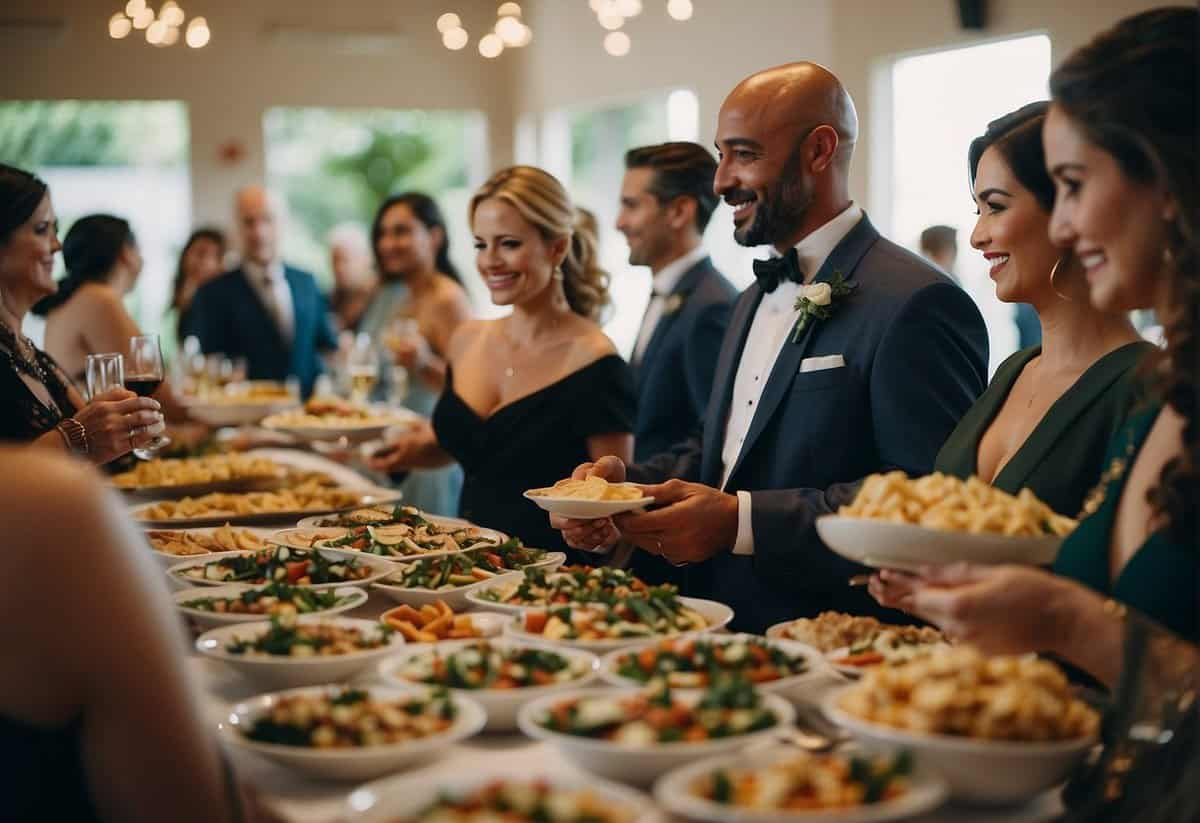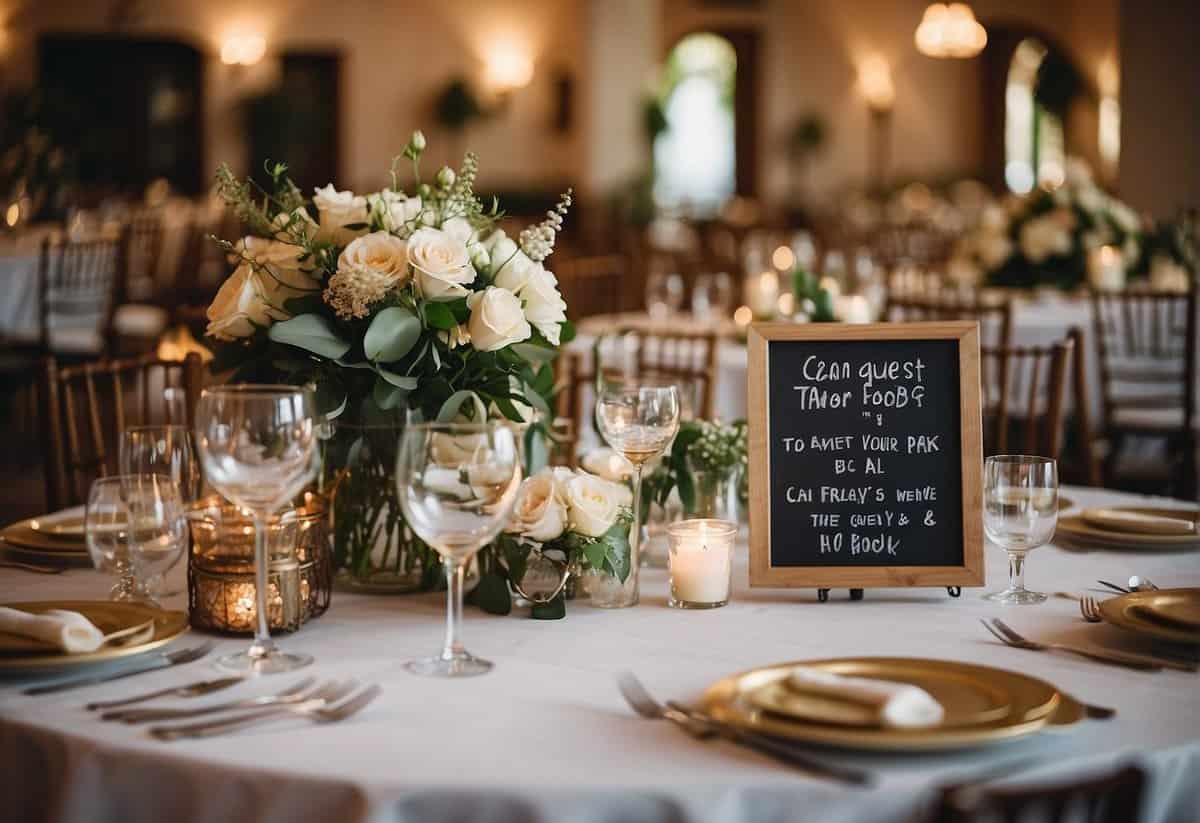Can You Ask Wedding Guests to Pay for Their Food? Etiquette and Tips Explained
Weddings are a celebration of love and the start of a lifelong partnership, yet they also come with their own set of challenges, especially when it comes to budgeting. One delicate question that arises during wedding planning is whether it’s appropriate to ask guests to pay for their own meal. The traditional approach to wedding etiquette suggests it’s the responsibility of the couple or their families to bear the cost of guest meals at the wedding reception, ensuring a warm and hospitable experience for those who come to share in the couple’s special day.

However, financial constraints and the desire for a more personalized wedding experience have led some couples to consider alternative options for their reception. With rising wedding costs, it’s understandable why the idea of asking guests to contribute to their meal might be considered. Yet, it’s crucial to weigh this against the expectations of wedding etiquette and the potential impact on your guests. Clear communication and thoughtful consideration are essential when deviating from traditional norms, aiming to maintain the spirit of generosity and gratitude that underpins the occasion.
Key Takeaways
- Weddings often involve complex budget considerations, making it crucial to prioritize costs.
- Traditional wedding etiquette generally covers guest expenses, reflecting a gesture of hospitality.
- Open and considerate communication regarding any non-traditional requests is essential for a smooth experience.
Understanding Wedding Etiquette

When you’re planning a wedding, it’s crucial to navigate the delicate intricacies of etiquette, particularly when it comes to handling expenses and understanding what’s traditionally expected of both you as a host and your guests.
Historical Perspective on Wedding Expenses
Historically, wedding etiquette has been clear that the host of the wedding reception—the party throwing the event, often the couple and their families—is traditionally responsible for all associated costs. This includes providing food, beverages, and entertainment for guests. The unspoken rule is that by accepting an invitation to a wedding, guests were being welcomed to a celebration at no cost to themselves. To ask wedding guests to pay for their meal was considered a breach of wedding etiquette and potentially tacky.
Modern Shifts in Wedding Expectations
Today, however, there’s a more diverse range of wedding styles and budgets, and some couples explore ways to offset wedding expenses. While still not conventional, you might come across conversations on this topic in various online forums. For example, some discussions focus on whether or not guests should pay for their meal if the couple can’t afford a traditional reception. Others suggest alternate ways of requesting contributions for the meal, such as reimbursements. However, it’s important to approach this idea with sensitivity, as it can be a delicate issue and potentially off-putting to some wedding guests.
In modern wedding planning, it’s essential to consider what feels true to you as a couple while also prioritizing the comfort and enjoyment of your guests. Striking a balance can be tricky, but open communication and thoughtful consideration of established rules and etiquette can guide your decisions.
Budgeting for Your Wedding

When planning your wedding, it’s essential to create a comprehensive budget that covers all your expenses, from venue rental to catering. Proper budgeting ensures you can celebrate your special day without financial strain.
Assessing Total Wedding Costs
Before diving into specifics, it’s crucial to assess the full scope of your wedding costs. Compile a list of every expense you anticipate, including the venue, attire, decorations, entertainment, and more. Use a spreadsheet to track your estimates and actual spends, which will also help in determining your total wedding budget.
Allocating Funds for Food and Drink
A significant portion of your budget will go toward food and drink. Catering expenses will vary depending on your guest count, the type of meal served, and whether you choose a sit-down dinner or a buffet. Allocate funds accordingly, ensuring you prioritize guest satisfaction while staying within budget.
Considering Guest Contributions
While traditionally the couple covers all costs, if budget constraints are tight, you might contemplate guest contributions toward their meal. This is a delicate issue and must be approached tactfully. If you decide to explore this option, consider wording your invitations clearly and kindly. Information on how others have approached asking guests to pay for their meal can be insightful. Remember, guest contributions should not be expected but can be an option if traditional gifts are not a priority and communicated appropriately.
Invitations and Communication

Crafting invitation wording and managing RSVPs for your wedding can be a delicate task, especially if you’re considering having guests pay for their food. Clear communication across your invitations, wedding website, and RSVP process is essential.
Wording Your Invitations
For your wedding invitations, your primary goal is to convey the message with tact and transparency. When mentioning that guests will need to pay for their meal, it’s important to do so gracefully. Here’s an appropriate way to phrase it:
- Option 1: “We invite you to join us for our special day. While your presence is the greatest gift, please note that we have chosen a unique dining experience where guests are invited to pay for their meal directly.”
- Option 2: “Join us for a celebration of love. In lieu of traditional wedding gifts, we kindly ask guests to contribute to their dining experience.”
Utilizing Your Wedding Website
Your wedding website is a versatile tool for detailing your “guests-pay” approach without cluttering the wedding invitation. On your site, you can offer more context and explain your decision in a heartfelt manner.
- Clarifications: Provide a brief explanation of why you’ve chosen this approach and express your sincerest gratitude for their understanding.
- Payment Details: If there’s a specific payment method like PayPal, inform guests clearly about how they can make their payments.
Effective RSVP Management
To ensure a smooth experience for your guests, streamline your RSVP process with the following elements:
- RSVP Card: Include a pre-stamped and addressed RSVP card within the invitation where guests can confirm their attendance.
- Phone and Email: Offer additional RSVP options via phone or email for convenience. Always provide clear instructions for these methods on both the invitation and the wedding website.
- Follow-Up: Sending a friendly reminder as the RSVP deadline approaches can help manage responses and any related meal payments. A quick “thank you” message for their timely response is a warm gesture of appreciation.
Remember, keep your communication warm and courteous to maintain the joyous tone of your wedding, even when discussing the practical aspects like meal payments.
Alternative Options for Wedding Receptions

Exploring various reception models can make your big day memorable while fitting within your budget. From the type of bar service to the style of dining, here are specific strategies to consider for tailoring your reception.
Cash Bar vs Open Bar
Opting for a cash bar means your guests pay for their own alcoholic beverages, significantly reducing your expenses. This approach can be more affordable and prevents unnecessary waste. On the flip side, an open bar is seen as a generous gesture, often expected at traditional receptions, and can be tailored with a limited menu of drinks to control costs.
Potluck-Style Wedding Ideas
A potluck-style wedding instills a sense of community as guests contribute a dish. This casual approach can encompass a variety of vegetarian options and international cuisines, reflecting the couple’s tastes while offering a more affordable option. Set up a sign-up sheet beforehand to ensure a balanced menu. Consider this as a chance to exchange food and drink as gifts, fostering a shared dining experience.
Dessert-Only Reception
A dessert-only reception can offer a sweet finale without the cost of a full meal. Feature a spread of desserts like a tiered cake, chocolate fountains, or assorted pastries. This affordable option allows for a wide range of choices and the inclusion of beverages like coffee and tea to complement the sweets. Plus, a beautifully decorated dessert table makes a stunning focal point.
Frequently Asked Questions

Navigating wedding etiquette can be challenging, especially when it comes to the subject of finances and guest contributions. Below are some targeted questions and answers to guide you through this delicate topic.
Is it acceptable to request guests to cover their own meal costs at a wedding?
Generally, it is not considered traditional to ask guests to pay for their meal at a wedding. This is because the hosts typically cover all costs associated with the event as a gesture of hospitality.
What is the proper invitation wording when asking guests to pay for their meal?
While it’s unconventional to request guests to pay for their meal, if you must do so, ensure the wording is clear and courteous. For example, you could include a line such as “We are hosting a self-funded meal to celebrate our union,” with further details provided on the RSVP card or wedding website.
Are there ways to politely inform wedding guests they’ll be paying for their own food?
If you’re considering a wedding where guests pay for their own meals, communicate this clearly and gently on the invitation or wedding website, perhaps by referring to the event as a “Dutch-treat dinner” in a warm and welcoming manner. You can find FAQ suggestions for your wedding website that may assist with wording.
In what situations is it considered appropriate for guests to pay for their own meals at a wedding?
It may be more acceptable for guests to pay for their meals in extremely informal or non-traditional weddings, such as a small gathering at a restaurant, where the expectation is set from the beginning. Guests should be notified well in advance.
How can I let my guests know they need to pay for their drinks at the wedding?
To inform guests they will be paying for their own drinks, mention it on your wedding website or in the RSVP materials. For example, you could note “Cash bar available” so guests are prepared to cover their own drink costs.
What are some tactful ways to organize a pay-your-own-way birthday party at a restaurant?
When planning a pay-your-own-way event, like a birthday party at a restaurant, be upfront with guests. Include a polite note in the invitation saying something like, “Join us for a casual meal to celebrate [Name’s] birthday. Each guest will cover their own dining expenses.” This sets expectations clearly from the outset.

